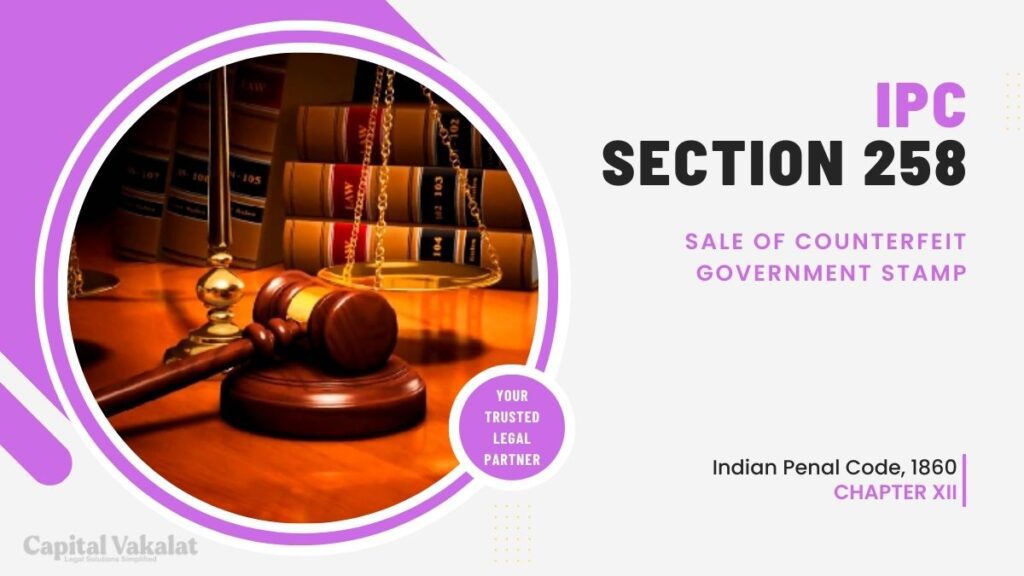In the realm of legal statutes, Section 258 of the Indian Penal Code (IPC) plays a significant role in safeguarding the integrity of government-issued documents and financial transactions. This particular section pertains to the sale of counterfeit government stamps, an offense that carries both legal and societal implications.
In this comprehensive article, we will delve into the intricacies of Section 258 IPC, shedding light on its provisions, the gravity of the offense, legal consequences, and its overall impact on the nation. So, fasten your seatbelts as we embark on this enlightening journey into the world of counterfeit government stamps.

Counterfeit activities are not limited to luxury goods and currency; they extend to essential instruments that support the functioning of a nation’s bureaucracy. Government stamps are one such instrument, and their counterfeiting is a grave offense under Section 258 of the IPC. This article explores the nuances of this section, discussing its importance, the implications of counterfeit stamps, and how the legal system addresses this issue.
Understanding Government Stamps
Government stamps are officially issued by the government for a multitude of purposes. They are typically used in various transactions, including property dealings, agreements, and court processes. These stamps signify that a financial transaction or an agreement is legitimate and authorized by the government. They serve as a form of proof, confirming that the appropriate duties or fees have been paid.
The Significance of Government Stamps
Government stamps, though small and often overlooked, play a pivotal role in the legal and financial system of a country. They help generate revenue for the government and ensure transparency in transactions. Without these stamps, it would be challenging to maintain the integrity of financial and legal documents.
Section 258 IPC: An Overview
Section 258 of the IPC deals with offenses related to government stamps. It explicitly criminalizes the sale, transfer, distribution, or possession of counterfeit government stamps. The objective is to deter fraudulent activities and maintain the sanctity of government-issued documents.
Offenses Covered Under Section 258
This section covers a range of offenses related to counterfeit government stamps, including:
- Sale of Counterfeit Stamps: Deliberately selling stamps that are not genuine.
- Transfer of Counterfeit Stamps: Illegally passing counterfeit stamps to others.
- Possession of Counterfeit Stamps: Holding counterfeit stamps with the intent to use or distribute them.
- Making Counterfeit Stamps: Forging or creating counterfeit government stamps.
Legal Consequences
The legal consequences for violating Section 258 of the IPC can be severe. Offenders may face imprisonment and fines, depending on the gravity of the offense. These penalties are imposed to deter individuals from engaging in the illicit trade of counterfeit stamps.
Challenges in Enforcement
The enforcement of Section 258 is not without its challenges. Identifying counterfeit stamps can be complex, as forgers often produce near-identical copies. Law enforcement agencies must employ advanced techniques and collaborate with experts to combat this issue effectively.
Recent Cases
Several notable cases in India have shed light on the prevalence of counterfeit government stamps and the legal actions taken against those involved. Exploring these cases provides insight into the magnitude of the problem and the measures being taken to address it.
Combating Counterfeit Stamps
Efforts to combat counterfeit stamps involve a combination of legal measures, public awareness campaigns, and technological advancements. These efforts aim to reduce the demand for counterfeit stamps and improve detection and enforcement mechanisms.
Conclusion
In conclusion, Section 258 IPC plays a vital role in protecting the integrity of government-issued documents and financial transactions. Counterfeit government stamps undermine the trust and efficiency of the legal and financial system. The legal consequences associated with the sale and possession of counterfeit stamps underscore the seriousness of this offense. To safeguard the nation’s interests, it is imperative that society remains vigilant and supports the enforcement of this section.
Frequently Asked Questions
How can one identify counterfeit government stamps?
Identifying counterfeit government stamps can be challenging, as forgers often produce convincing copies. It is advisable to consult with experts or use advanced authentication methods to verify the authenticity of government stamps.
Why are government stamps essential in financial transactions?
Government stamps are essential in financial transactions because they validate the legitimacy of agreements and transactions. They provide proof that the required duties or fees have been paid, ensuring transparency and legal compliance.
Are there any recent initiatives to combat counterfeit government stamps?
Yes, there are ongoing initiatives to combat counterfeit government stamps. These efforts include public awareness campaigns, technological advancements, and enhanced enforcement measures to reduce the prevalence of counterfeit stamps.
What can individuals do to support the enforcement of Section 258 IPC?
Individuals can support the enforcement of Section 258 IPC by being vigilant, reporting suspicious activities, and spreading awareness about the consequences of dealing with counterfeit government stamps. Collaborating with law enforcement is essential in combating this issue effectively.